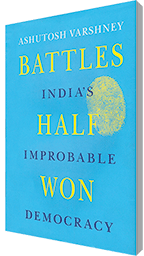A Great Clamour by Pankaj Mishra; Penguin Books; Rs.400; Pages 325

DURING THE PAST century Indian politicians and intellectuals suffering the humiliations heaped upon the people of Asia by Western colonial powers, have sporadically attempted to reach out to the people of China and Japan to make common cause on the basis of shared values and cultural affinities posited as superior to Western ideologies of individualism, imperialism and limitless industrial growth.
Among them were poet, philosopher and educationist Rabindranath Tagore (1861-1941) who visited China and Japan several times to preach Asian values of peace, harmony, contentment and spiritualism. But there were few takers for so-called Asian values among elites eager to replicate the Western industrial development model. In this riveting collection of essays — the outcome of purposive travels in resurgent China (including Tibet), Hong Kong, Mongolia, Taiwan, Malaysia, Indonesia and Japan — Pankaj Mishra investigates if any commonalities do indeed bind the countries of Asia and the East.
The failure of Tagore, Subhas Chandra Bose and other intellectuals to build bridges to the East, has prompted Mishra to follow in their footsteps a century later to traverse a transformed Asian continent dominated by China, which has emerged as the new global superpower following the retreat of the Red Devils from Asia. Therefore quite logically, this searching travelogue begins with a revisionist history of communist China which unlike post-independence India, rejected Western democracy and seems to have achieved brilliant success to emerge as factory of the world, and an economic (and military) power-house which may well re-emerge as the Middle Kingdom of the 21st century.
But to those dazzled by communist China’s growing might, the author confirms that by tolerating the “pseudo-scientific visions of socioeconomic engineering” of chairman Mao Zedong (1893-1976), the republic’s first helmsman, the people of China paid a heavy price for modest material prosperity. During the Great Leap Forward (1958-62), which included “a hundred absurd schemes” born out of chairman Mao’s “uneducated infatuation with the signs and symbols of modern progress”, 30 million — some accounts estimate 45-60 million — peasants died of starvation. To that humungous number, add another 10-12 million killed during the Cultural Revolution (1966-76).
Framed in a historical context, Mishra’s finely written investigative travelogue informs the subcontinent’s public about what’s happening in politics, academics and on the literary scene in contemporary China. Today the People’s Republic is the world’s largest creditor nation and second largest economy. But within the seemingly homogenous, conformist nation there is intense debate in the intelligentsia and academy about whether there is an inherent contradiction between a communist autocracy and free market economics as practiced in China today.
Unknown to most Indians, there is a strident and growing group of intellectuals led by Prof. Zu Xueqin who are advancing the argument that the logical progression of China’s free market reforms is “all other kinds of freedoms” leading to full-fledged democracy. On the other hand, there’s also the ‘New Left’ comprising writers, academics and activists who believe the country’s free market reforms have gone too far, too fast, leaving the country’s 800 million peasants fallen by the wayside to fend for themselves. Among the latter are Wang Hui, former co-editor of Dushu, an intellectual journal; Yu Ha, author of a bestseller novel Brothers, and Woeser, a remarkably outspoken poet and essayist fiercely opposed to Chinese rule over Tibet, who denounces the newly-built railroad to Tibet — the pride of China and an extraordinary feat of engineering — as a “colonial imposition”. In an insightful analysis of the Chinese state, Mishra reports on the intellectual ferment behind China’s iron curtain.
Although ground conditions are indeed radically different, the problems of engineering growth with equity are common to China and India. Thus there’s huge potential for mutually beneficial cooperation, trade and intellectual exchange between Asia’s two most populous countries which it is pertinent to note, less than 400 years ago contributed over 50 percent of global GNP.
Peace in Asia is dependent upon aiding and abetting the nascent democracy movement in China and enabling the Chinese people to free themselves from the brutal, venal Communist Party of China (CPC) leadership. The policy of successive governments in New Delhi to ruinously boost defence expenditure year after year to contain China is not only doomed to failure given the industrial superiority of the latter, but could risk uniting the oppressed Chinese people behind the intimidating commissars of the CPC.
There’s much else in these refreshing Eastward-looking essays including a dizzying, evocative ride on the world’s most elevated railway line which joins China with Tibet, and the author’s political and socio-economic analyses of China’s neighbours — Hong Kong, Mongolia, Taiwan, Malaysia, Indonesia and Japan. Pankaj Mishra’s A Great Clamour presents an engaging blend of descriptive travelogue, political discourse and sophisticated analyses of the newly assertive nations in our Asian neighbourhood.
Dilip Thakore
Woman power polemic
Lean In: Women, Work, and the Will to Lead by Sheryl Sandberg; Random House; Rs.399; Pages 232
ON INTERNATIONAL Women’s Day (March 8), the Organisation for Economic Co-operation and Development (OECD) released a report revealing that the average Indian man invests a mere 19 minutes per day per year on routine household work, the lowest contribution of men in any country worldwide. Australian men average 93 minutes and French males 98 minutes per day. Quite obviously, Indian men have to outgrow the traditional belief that domesticity is a woman’s sphere and they have no moral or social obligation to share it.
Such Neanderthals definitely need to read Sheryl Sandberg’s thought-provoking and compelling Lean In: Women, Work, and the Will to Lead. A combination of autobiography, sociology, and psychology, it contests stereotypes about females in the workplace and is an inspiration to women with ambition who rightly expect their partners to share household work.
A Harvard B-school alumna, Sandberg — the chief operating officer of Facebook since 2008 — is a woman of high intelligence and candour, and arguably the most successful and famous woman corporate executive worldwide. Through personal experience, research and anecdote, Sandberg explains why so few women make it to the top in business and politics. According to her, of 197 heads of state, only 22 are women; of the top 500 companies by revenue, only 21 are headed by women. In politics, women hold only 18 percent of congressional offices. And even to this day, the average American woman — surely the world’s most emancipated — is paid 77 cents for every dollar paid to men. “A truly equal world would be one where women ran half our countries and companies and men ran half our homes,” she writes.
But while Sandberg believes that traditional male patriarchy is partly to blame for subjugation of women, she also seems convinced that women sabotage their own success because they don’t believe in themselves. There are things women can do to take charge of their careers right now that are not entirely reliant on mending the system. Although women are cabined, cribbed and confined by traditional barriers, consciously or sub-consciously erected by men, they are also — perhaps to a great extent — victims of many emotional pressures that exist within themselves. Women “lean back” and are too self-effacing about demanding pay hikes and promotions, and tend to question their own ability to lead, much more than men do.
In 11 chapters, this primer for ambitious women offers a course of action on how to push themselves forward to further their careers. The straight talking author highlights how a great majority of women yield to masculine power by heading for the advisory back row of conference tables, and pass up opportunities to assume greater responsibility because they might want to raise a family later. Her oft quoted phrase “If you weren’t afraid” addresses the self-doubt that holds women back. If women believe they can juggle lucrative careers and children, own their success and are assertive in the home, they will become empowered to demand more from employers and partners.
India is at a tipping point. While a rising number of women have attained top executive positions, they often tend to morph into the worst enemies of women’s progress. Indian women need strong, indigenous female role models willing to buck tradition, proud to pursue a feminist agenda and take the risk of speaking up for their sisters. More than all others, women with self-respect need to read this illuminating book.
Bharati Thakore